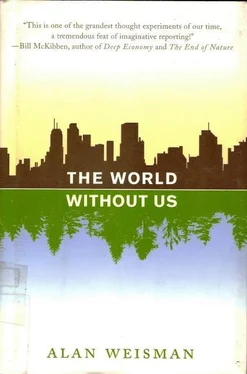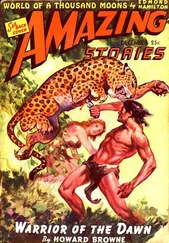In non-Maasai areas, such as up at Lake Victoria, where the Serengeti animals migrate each year, coffee growers too sick with AIDS to groom their plants have turned to growing easy staples like bananas, or cutting trees to make charcoal. Coffee bushes, now feral, are 15 feet high, beyond rehabilitation. Santian has heard people say they don’t care anymore, there’s no cure, so they won’t stop having children. So orphans now live with a virus instead of with parents, in villages where the adults have been all but wiped out.
Houses with no one left alive are collapsing. Mud-stick huts with dung roofs have melted away, leaving only half-finished houses of brick and cement begun by traders with money made from driving their lorries. Then they got sick, and gave their money to herbalists to cure them and their girlfriends. Nobody got well, and construction never resumed. The herbalists got all the money, then got sick themselves. In the end, the traders died, the girlfriends died, the medicine men died, and the money vanished; all that remains are roofless houses with acacias growing in the middle, and infected children who sell themselves to survive until they die early.
“It’s wiping out a generation of future leaders,” Santian had replied to Koonyi that afternoon, but the old Maasai figured that future leaders wouldn’t matter much with animals back in charge.
The sun rolls along the Serengeti Plain, filling the sky with iridescence. As it falls over the edge, blue twilight settles on the savanna. The day’s remaining warmth floats up the side of Kileleoni Hill and dissolves into the dusk. The chilly updraft that follows carries the screech of baboons. Santian pulls his red-and-yellow tartan shuka tighter.
Could AIDS be the animals’ final revenge? If so, Pan troglodytes, our chimpanzee siblings in central Africa’s womb, are accessories to our undoing. The human immunodeficiency virus that infects most people is closely related to a simian strain that chimps carry without getting sick. (The less-common HIV-II is similar to a form carried by rare mangabey monkeys found in Tanzania.) Infection probably spread to humans through bush meat. On encountering the 4 percent of our genes that differ from the genes of our closest primate relations, the virus mutated lethally.
Had moving to the savanna somehow made us biochemically more vulnerable? Santian can identify every mammal, bird, reptile, tree, and spider, and most flowers, visible insects, and medicinal plants in this ecosystem, but some subtle genetic differences escape him—and everyone searching for an AIDS vaccine as well. The answer may be in our brain, since brain size is where humans differ significantly from chimps and bonobos.
Another burst of yakking from the baboon troop drifts up from below. Probably they’re harassing the leopard who hung the impala meat. Interesting how male baboons vying for alpha status have learned to maintain a truce long enough to cooperate in discouraging leopards. Baboons also have the largest brain of any primate after Homo sapiens, and are the only other primate that adapted to living in savannas as forest habitats shrank.
If the dominant ungulates of the savanna—cattle—disappear, wildebeest will expand to take their place. If humans vanish, will baboons move into ours? Has their cranial capacity lay suppressed during the Holocene because we got the jump on them, being first out of the trees? With us no longer in their way, will their mental potential surge to the occasion and push them into a sudden, punctuated evolutionary scramble into every cranny of our vacant niche?
Santian rises and stretches. A new moon rocks toward the equatorial horizon, its points curving upward like a bowl for silvery Venus to settle inside. The Southern Cross and Milky Way assume their places. The air smells like violets. Up here, Santian hears wood owls, like those he knew in his boyhood until the forests around their bomas turned to wheat fields. If human crops revert to a mosaic of woods and grassland, and if baboons fill our keystone slot, would they be satisfied to dwell in pure natural beauty?
Or would curiosity and sheer narcissistic delight in their unfolding powers eventually push them and their planet to the brink, too?
PART II

CHAPTER 7

What Falls Apart
IN THE SUMMER of 1976, Allan Cavinder got a call he wasn’t expecting. The Constantia Hotel in Varosha was reopening under a new name after standing vacant for nearly two years. A lot of electrical work was needed—was he available?
This was a surprise. Varosha, a resort on the eastern shore of the Mediterranean island of Cyprus, had been off-limits to everyone since war fractured the country two years earlier. The actual fighting had lasted only a month before the United Nations stepped in to broker a messy truce between Turkish and Greek Cypriots. A no-man’s zone called the Green Line was drawn wherever opposing troops found themselves at the exact moment of the cease-fire. In the capital, Nicosia, the Green Line wandered like a drunk among bullet-scarred avenues and houses. On narrow streets where hand-to-hand combat had been underway between enemies jabbing bayonets from facing balconies, it was little more than 10 feet wide. In the country, it broadened to five miles. Turks now lived to the north and Greeks to the south of a weedy UN-patrolled strip, refuge to hares and partridges.
When the war broke out in 1974, much of Varosha was barely two years old. Strung along a sand crescent south of the deep-water port of Famagusta, a walled city dating to 2000 BC, Varosha had been developed by Greek Cypriots as Cyprus’s Riviera. By 1972, tall hotels extended three uninterrupted miles along Varosha’s golden beach, backed by blocks of shops, restaurants, cinemas, vacation bungalows, and employee housing. The location had been chosen for the gentle, warm waters on the island’s wind-sheltered eastern coast. The sole flaw was the decision, repeated by nearly every beachfront high-rise, to build as close to shore as possible. Too late, they realized that once the sun peaked at noon, the beach would lie in a shadow cast by the palisade of hotels.
There wasn’t much time to worry about that, though. In the summer of 1974, war flared, and when it halted a month later, Varosha’s Greek Cypriots saw their grand investment end up on the Turkish side of the Green Line. They and all Varosha’s residents had to flee south, to the Greek side of the island.
About the size of Connecticut, mountainous Cyprus floats in a placid aquamarine sea ringed by several countries whose genetically intertwined peoples often detest each other. Ethnic Greeks arrived on Cyprus some 4,000 years ago, and subsequently lived under a parade of conquering Assyrians, Phoenicians, Persians, Romans, Arabs, Byzantines, English crusaders, French, and Venetians. The year 1570 brought yet another conqueror, the Ottoman Empire. With it came Turkish settlers, who by the 20th century would comprise slightly less than one-fifth of the island’s population.
After World War I finished off the Ottomans, Cyprus ended up as a British colony. The island’s Greeks, Orthodox Christians who had periodically revolted against the Ottoman Turks, weren’t thrilled to have British rulers instead, and clamored for unification with Greece. The Turkish Cypriot Muslim minority protested. Tensions boiled for decades and erupted viciously several times during the 1950s. A 1960 compromise resulted in the independent Republic of Cyprus, with power shared between Greeks and Turks.
Ethnic hatred, however, had by then become a habit: Greeks massacred entire Turkish families, and Turks ferociously avenged them. A military takeover in Greece detonated a coup on the island, midwifed by the American CIA in honor of Greece’s new anticommunist rulers. That prompted Turkey in July 1974 to send troops to protect Turkish Cypriots from being annexed by Greece. During the ensuing brief war, each side was accused of inflicting atrocities on the other’s civilians. When the Greeks placed anti-aircraft guns atop a high-rise in the seaside resort of Varosha, Turkish bombers attacked in American-made jets, and Varosha’s Greeks ran for their lives.
Читать дальше












